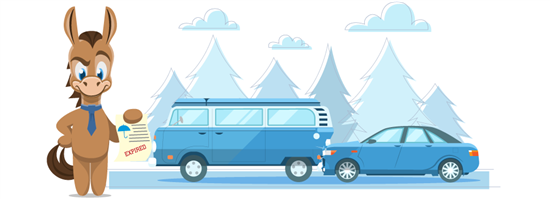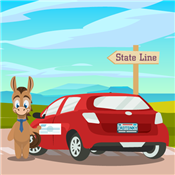Car Insurance Lapse: What You Need to Know
A lapse in car insurance can cost you money and put you at risk. Learn what causes a lapse, how to fix it, and the best ways to avoid one in our guide.
 |
| © CreditDonkey |
- What Is a Lapse in Car Insurance?
- How Long Can You Be Without Car Insurance?
- How a Lapse in Coverage Could Affect You
- How Does a Lapse in Coverage Affect Auto Insurance Rates?
- What to Do If You Have a Lapse in Coverage
- DMV Fees by State
- Insurance Lapse Grace Period
- Tips to Avoid a Car Insurance Lapse
- What If I No Longer Need Car Insurance?
If you have a registered vehicle, most states require you to have car insurance—even if you don't plan on driving the car.
If you drive your car, you MUST have auto insurance. Driving while uninsured is illegal, and could lead to hefty fines, license suspension, or even jail time depending on your state's laws.
What Is a Lapse in Car Insurance?
A lapse in auto insurance is any period in which a registered vehicle goes from being insured to being uninsured. Some reasons for this include:
- Your policy ended and you forgot to renew it.
- You missed a monthly payment.
- You are deployed overseas.
- You are studying or moving abroad.
- You aren't driving your car because it broke down or you were in an accident.
- You sold your vehicle.
Lapses in car insurance coverage can have serious consequences. Keep reading to learn more.
How Long Can You Be Without Car Insurance?
There is no allowable period of time for driving without car insurance. Whether the lapse is one day, a few weeks, or even months, you could face significant fines and other penalties.
And if you get into an accident while driving uninsured, your problems will get even worse (more on that below).
Life happens, and it's possible you may miss a payment or forget to renew your coverage. But if your insurance lapses, talk to your insurance company right away to get your coverage reinstated.
How a Lapse in Car Insurance Could Affect You
Personal Liability
If you're in an accident or pulled over by the police, you could face significant fines or penalties if you aren't insured. Any damage you cause will have to paid for out of pocket.
Not having insurance can be a significant drain on your finances. Worse yet, the other driver could take legal action, costing you even more money or assets.
License Suspension or Fines
In some states, your insurance company will notify the DMV that you do not have insurance. The DMV can then fine you or even suspend your license if you're caught driving uninsured (more on DMV fees below).
By driving uninsured, you could also be required to carry an SR-22 certificate, which makes your insurance more expensive as long as the certificate is in place.
An SR-22 certificate verifies that you're carrying at least the state-mandated amount of car insurance. Your insurance company lets the state know that you're financially responsible for any accidents. It also notifies the state if you let your insurance lapse.
You can get the SR-22 from an insurance company after you purchase a policy, or, if you have existing auto insurance, you may add an SR-22 and file it with the state.
Repossession
Your vehicle could be repossessed by your lending or leasing company if they require full insurance coverage in the terms of your contract.
Legal Penalties
If you have a registered vehicle, almost every state requires you to have auto insurance. Some states even require insurance companies to report to the DMV whenever the insurance for a vehicle has lapsed. If you are caught driving without insurance, the consequences could include:
- Jail time
- Points on your license
- Having your vehicle impounded
- Court fees and reinstatement fees
How Does a Lapse in Car Insurance Affect Rates?
An insurance company will consider you a high-risk driver if you have a lapse in auto coverage. Because of this, they may charge you a higher premium.
If you cancel and reinstate your policy within 30 days, your rates can increase an average of 8%–10% per month (or $70–$165), depending on your carrier and coverage level.
If you reinstate your policy after more than 30 days, you can expect an average premium increase of 30%, or up to $250 per month. The longer you go without coverage, the more your rates will increase.
The amount your insurance rates will increase can also depend on a variety of other factors, including your coverage limits, your driving record, and insurance history. Typically, the longer you carry auto insurance and the higher coverage you maintain, the lower your rates will be.
What to Do If You Have a Lapse in Coverage
First and foremost, it's important to never drive while uninsured. If caught, you could face fines and license suspension. If you're in an accident while uninsured, you could even face jail time in some states.
If your coverage lapses, you should:
- Immediately contact your insurance company
Find out how long you've been without coverage. You may still fall within the grace period and can reinstate your coverage by paying your missed payment. There's a chance your coverage hasn't been canceled. - Try to reinstate your policy
If your policy was canceled, ask your insurance provider if it can be reinstated. You may be able to avoid a lapse by paying the past-due balance and a reinstatement fee, but this depends on the company. - If you can't reinstate your policy, get a new one ASAP
If you're past the reinstatement period, you should start a new policy immediately. It will likely be more expensive because you'll be considered higher risk, but you must have an active policy before you drive.
Some insurance companies won't write a policy for someone who hasn't maintained continuous coverage, so make sure to check with different carriers to pick the right one for you.
DMV Fees for Insurance Lapse by State
Note: This chart shows penalties for a lapse in insurance coverage only. They do not include legal penalties for driving without insurance, which can be $200–$500 or more for the first offense, and up to $1,000 or more for the second and subsequent offenses.
| State | Penalty |
|---|---|
| Alabama | $200 license reinstatement penalty first offense; $300 for second offense; $400 for third and subsequent offenses |
| Alaska | $100 license reinstatement penalty for first offense; $250 if combined with non-DUI offense |
| Arizona | $50 license reinstatement penalty |
| Arkansas | $50 license reinstatement penalty |
| California | $14 license reinstatement penalty |
| Colorado | $40 license reinstatement penalty |
| Connecticut | $200 license reinstatement penalty |
| Delaware | $100 lapse penalty per vehicle; $5 per day after 30 days |
| Florida | $150 registration and license reinstatement penalty for first offense; $250 for second offense; $500 for third offense within 3 years |
| Georgia | $25 penalty for lapse longer than 10 days (must be paid within 30 days), $60 reinstatement fee |
| Hawaii | $20 license reinstatement penalty |
| Idaho | $85 license reinstatement penalty |
| Illinois | $100 reinstatement penalty |
| Indiana | $150 reinstatement penalty for first offense; $225 for second offense; $300 for third offense |
| Iowa | Must show proof of financial responsibility only after an accident (may incur $485 in penalties and fees) |
| Kansas | $100 reinstatement penalty for first offense; $300 for second offense within 1 year |
| Kentucky | $40 registration reinstatement penalty |
| Louisiana | $125 lapse penalty for 30 days; $225 for 31–90 days; $525 over 90 days (up to $850) |
| Maine | $50 license reinstatement penalty, $20–$30 additional penalty, $35 registration penalty |
| Maryland | $150 penalty first 30 days; $7 for each day following 30 days; $25 registration penalty |
| Massachusetts | $500 reinstatement penalty |
| Michigan | $50 reinstatement penalty |
| Minnesota | $30 license and registration reinstatement penalty |
| Mississippi | $30 license reinstatement penalty |
| Missouri | $20 license reinstatement penalty for first offense; $200 after second offense; $400 after third offense |
| Montana | No charge for first lapse of insurance |
| Nebraska | $500 reinstatement penalty |
| Nevada | $250 penalty for under 30 days, $250 if lapse between 30 and 90 days; $500 if lapse between 91 and 180 days; $1,000 lapse more than 181 days |
| New Hampshire | Only proof of financial responsibility is required |
| New Jersey | $100 restoration penalty |
| New Mexico | $30 registration reinstatement penalty |
| New York | $8 per day civil penalty for lapses under 30 days; $10 per day for 31–60 days; $12 per day for 61–90 days |
| North Carolina | $50 civil penalty first lapse; $100 second lapse; $150 third and subsequent lapses |
| North Dakota | No loss of license or registration on first offense |
| Ohio | $60 penalty, $100 reinstatement penalty for first offense; $300 for second offense; $600 for third offense |
| Oklahoma | $125 administrative penalty, $275 reinstatement penalty |
| Oregon | $75 license and registration reinstatement penalty |
| Pennsylvania | $88 restoration penalty |
| South Carolina | $5 per day lapse penalty (up to $200), $550 uninsured motorist fee (if applicable) |
| South Dakota | $50–$200 license reinstatement penalty (depending on the length of non-compliance), $28 application fee |
| Tennessee | $50 administrative penalty, $65 license and registration restoration penalty |
| Texas | $100 reinstatement penalty |
| Utah | $100 reinstatement penalty |
| Vermont | $71 license reinstatement penalty |
| Virginia | $145 registration reinstatement penalty |
| Washington | $75 reinstatement penalty |
| Washington D.C. | $150 penalty; $7 per day after 30 days |
| West Virginia | $100 registration reinstatement penalty |
| Wisconsin | $60 license reinstatement penalty |
| Wyoming | $50 reinstatement penalty |
Insurance Lapse Grace Period
If you miss a car payment, many insurance companies will give you a short grace period to pay your balance. If you're able to pay it within that time, your policy will continue without a lapse.
The grace period can range between 3 and 30 days, but some companies don't provide one at all. It's best to make your payments on time and not rely on a grace period.
If you miss a payment and your insurance company decides to cancel your policy, state laws require that they notify you by mail or email beforehand (usually 10–20 days).
Tips to Avoid a Lapse in Coverage
Follow these tips to keep your coverage active and avoid the stress of driving uninsured or facing penalties.
- Sign up for automatic renewal
Most companies provide automatic renewal after your term ends so you can have continuous coverage. - Reduce the cost of your premium
If you're unable to keep up with expensive insurance payments, talk to your insurance agent to restructure your policy. You could opt for lower coverage limits (while staying within state requirements), or see if you qualify for discounts. - Set up automatic payments
By setting up automatic monthly payments, you can ensure that you'll never miss paying a premium and avoid coverage cancellation. - Start your new policy before your old one ends
The period between policies counts as a lapse, and you can face legal consequences for driving during this time. - Keep your insurance company in the loop
Let your insurance company know if you're planning to sell or scrap your car. Don't just stop making payments. They'll assume you're driving your car without insurance, and you'll be considered a high-risk driver.
What If I No Longer Need Auto Insurance?
If you don't have a car and don't drive, you don't legally need auto insurance. But before you cancel your policy, determine how long you'll be without a car.
If you won't drive or have a car for a several years, it might be best to cancel your coverage.
If you need to drive a few times a year, or if you plan on getting a car in the near future, consider being added to someone else's policy or reducing your coverage instead. This could save you money in long run since you won't have to pay higher premiums for lapsed coverage.
If you're a member of the military, you may have the option to suspend your car insurance while on deployment. Suspending insurance will pause your coverage, but it won't count as a lapse. Talk to your agent or carrier to learn more and understand your options.
Bottom Line
A lapse in auto insurance coverage could leave you open to fines, higher premiums, or worst. To avoid any of these penalties, ensure you pay your monthly premium and keep an eye on your policy renewal date to ensure you don't miss any payments.
If you do have a lapse in coverage or you need to modify your policy, contact your insurance company immediately to understand your options and reinstate your policy if applicable.
Write to Caitlyn Callahan at feedback@creditdonkey.com. Follow us on Twitter and Facebook for our latest posts.






